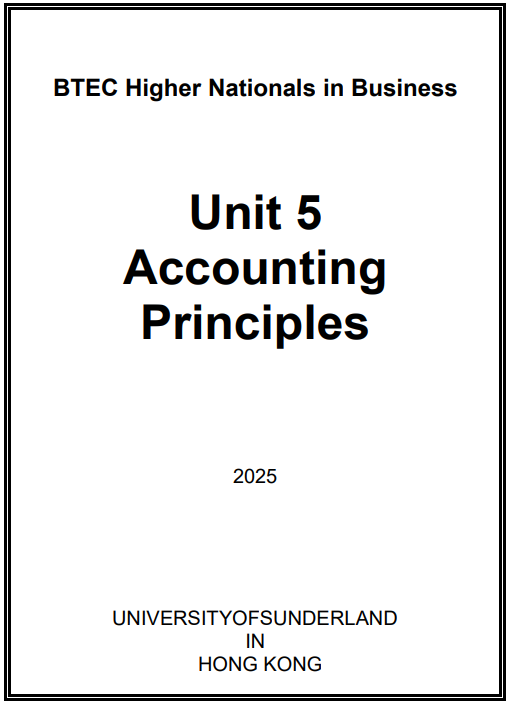| Category | Assignment | Subject | Accounting |
|---|---|---|---|
| University | University of Sunderland | Module Title | Accounting Principles |
| Assessment Type | Written Report |
|---|---|
| Academic Year | 2025 |

By the end of this unit, a student will be able to:
LO1 Examine the context and purpose of accounting
LO2 Prepare basic financial statements for unincorporated and small business organisations in accordance with accounting principles, conventions and standards
LO3: Interpret financial statements
LO4 Prepare budgets for planning, control and decision making using spreadsheets.
The accounting function in an organisation:
Different branches of accounting, e.g. financial, management, auditing, tax and forensic accounting.
Career opportunities in accounting and roles and responsibilities, e.g. accounts clerk, accounts assistant, qualified accountant.
Roles in commercial finance, e.g. cost analyst, business controller, pricing professionals and the global business services, e.g. purchase to pay (P2P) professionals and report to report (R2R) professionals.
Skills required for positions in accountancy and finance, e.g. numerical skills, problem solving, integrity, negotiation, and customer service.
Key skills and competences for accounting roles, e.g. managing the sale and purchase ledger, ensuring accounts are up to date, supplier reconciliations, inputting sales invoices on an accounts system and recording payments received.
Users and uses of financial information.
Interrelationships between the accounting and finance functions of other areas of the organisation and increasingly complex operating environments.
Context and purpose of financial and management accounting:
Purpose and scope of accounting, to include recording, reporting, and analysing information to inform decision making.
Role of supporting and new information technologies to support accounting and decision making.
Management accounting information, including systems, e.g. cost accounting, inventory management, job costing.
The benefits (streamline reporting, accuracy), risks and limitations (security threats, loss of data through power outages) of management accounting information.
Presenting financial information in a reliable, accurate, timely and persuasive way to satisfy the needs of internal and external stakeholders.
Accounting in an increasingly complex and fast-changing business environment, e.g. increased regulation and accountability, role of International Financial Reporting Standards (IFRS), risk management, reputation, sustainability, governance.
Pros and cons of shared service centres and outsourcing accounting services.
The accounting concept:
The accounting concept is the foundation for all financial statements.
Capital and revenue items:
Classifying revenue and capital income, and expenditures.
Producing basic financial statements:
Preparation of a profit and loss statement (income statement) and balance sheet (statement of financial position) for unincorporated organisations from a given trial balance.
Different types of income statements for sole traders, partnerships and not-for-profit organisations.
Adjustments required for accruals, prepayments, bad debts, and depreciation.
Value of using digital software for accounting and preparing financial statements, e.g. QuickBooks, Sage, Xero.
Importance and purpose of analysing financial statements:
To communicate financial positions and intentions with a range of stakeholders.
Ratio analysis:
Calculate profitability, liquidity, efficiency and investment ratios from given data.
Using calculated ratios to evaluate organisational performance.
Apply and critique relevant benchmarks, including time series, competitors, sector and internal.
Limitations of ratio analysis:
Ratio analysis is one means of measuring and evaluating the performance of an organisation, e.g. use of qualitative/non-financial measures. Limitations of using ratios as a performance measurement tool.
The interrelationships between ratios.
Importance and purpose of analysis of financial statements:
The interpretation and analysis of financial statements in the business environment.
Interpreting the relationship between the elements of the financial statements, profitability, liquidity, efficient use of resources and financial position.
Interpreting financial statements for meeting key performance indicators (KPIs) and sustainable performance.
Application of financial statements in different business contexts and the value of presenting to the end user of the financial statements.
Nature and purpose of budgeting:
Budgets as a key management accounting tool.
Definitions and reasons organisations use budgets.
Stages in the budgeting process: master and functional budgets.
Corrective action to inform resource allocation and decision-making.
Budget preparation and budgetary control:
Importance, role and limitations of budgets in controlling activity.
The principal budget factors and budget types include fixed, flexible, zero-based, incremental, rolling, activity-based, and value proposition.
Variance analysis.
The steps for the preparation of a cash budget.
Producing a spreadsheet:
The numerical and other information requirements for a spreadsheet, and how it should be structured to meet user needs.
Using a spreadsheet and techniques to enter, edit and organise numerical and other data.
How to format spreadsheet cells, rows, columns and worksheets effectively using appropriate tools and techniques
Use of formulas and filters to enter, edit and present numerical data.
Visual representation of data and data analysis using pie charts, bar charts and graphs.
Inserting spreadsheet data into Word® documents.
Assessment is a Written Report covering the assessment of all learning outcomes.
Meeting all the learning outcomes for the Pass criteria is required to complete the module successfully.
The criteria for a pass, merit and distinction are shown in the Assignment Brief.
ATRILL, P. and McLANEY, E. (2018) Accounting and Finance for Non-Specialists.
11th Ed. Harlow: Pearson.
DRURY, C. (2015) Management and Cost Accounting. 9th Ed. Cengage Learning.
SEAL, W. et al (2018). Management Accounting. 6th Ed. Maidenhead: McGraw-Hill.
WEETMAN, P. (2019). Financial and Management Accounting: An Introduction.
Harlow: Pearson.
Do You Need the Unit 5 Assignment for This Question
Order Non-Plagiarised Assignment
Need last-minute help with your Unit 5 Accounting Principles Assignment? We are here for accounting assignment help! From Business Management to technical subjects, we’ve got you covered. Explore our free assignment samples and experience the quality for yourself. Contact us now to get expert help and score better—without any stress! We also provide University of Sunderland Assignment Samples that the phd expert writers have written.
Hire Assignment Helper Today!
Let's Book Your Work with Our Expert and Get High-Quality Content
